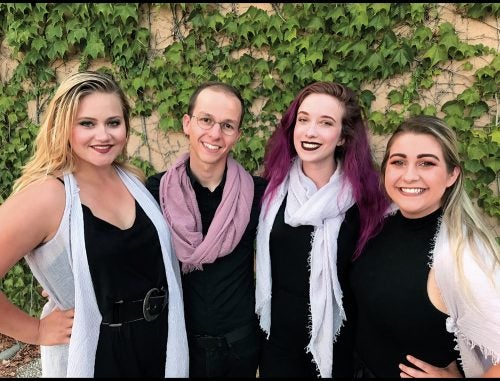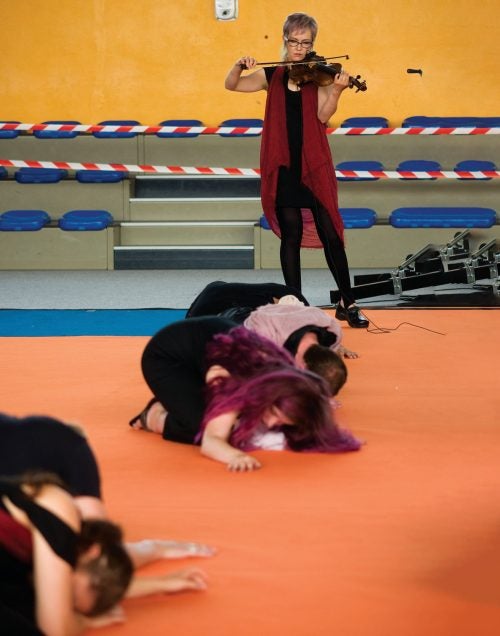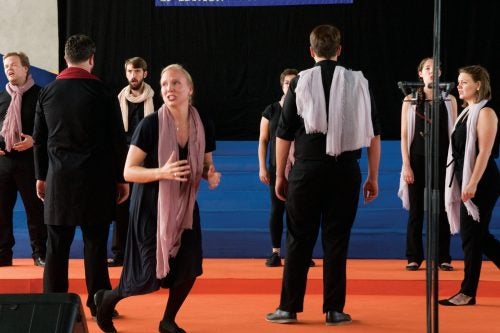VOICES 21C performs for a crowd of 6,000 at the Roman Theater during the Choralies festival in Vaison-la-Romaine, France, last August.
VOICES 21C is a choir with a cause. Raising their voices to bring important ideas and messages to life through music, the choir members, including four URI alumni, are transforming themselves and their audiences through the power of song.
By Marybeth Reilly-McGreen
If you turned 6 around the turn of the century, your birthday wish list might have included a Razor Scooter, Tamagotchi, Furby, Pokémon, or maybe a Barbie princess.
Ashley Frezza ’16 asked for a queen. The Queen of Soul. “I really wanted an Aretha Franklin CD,” Frezza says. “I loved the soulfulness that she brought to everything. Everyone has a different genre that speaks to their soul.”
What the 6-year-old Frezza couldn’t have known was that Franklin was a diva with an agenda. She was, in effect, speaking to the souls of her fans about heavy issues, weaving calls for social justice into lyrics. Beyond the feminist anthem “Respect,” songs like “A Change is Gonna Come,” “People Get Ready,” “Think,” and “Young, Gifted, and Black” underscored issues of civil rights, freedom, empowerment, and equity.

Now nearly 20 years later, Frezza is following Franklin’s lead, singing to advance social justice with VOICES 21C, a Massachusetts-based chamber choir, which, for the past four years, has been engaging in activism through music, selecting a different social justice theme to explore each year. In August, the choir represented the United States at the Choralies music festival in Vaison-la-Romaine, France, performing in front of an audience of more than 6,000. Its 2019 program, “Half the Sky: Voices, Struggles, Resilience and the Power of the Feminine Spirit,” features musical compositions written mostly by female-identifying composers that incorporate text by women poets and activists.
“Music has been a form of activism all over the world,” Frezza says. “It is a tool of expression and a universal language. Even if you are unable to understand the text being sung, you can hear it in the music and voices–the joy or anguish that is being portrayed.”
People have been raising their voices in protest for a long, long time. In fact, songs and political movements often go hand in hand. Abolitionists, suffragettes, unionists, human and civil rights advocates, war protestors, gay rights proponents, environmentalists, pacifists—even vegetarians—have turned to song to advance their causes.
“In our stitching together of every piece in the performance, the audience finds themselves understanding the bigger, interconnected picture of social change that is desperately being asked of today’s population.”
–Michael Genese ’16
Frezza, an alto, is one of four URI alumni in the 22-member choir, singing alongside Michael Genese ’16, a founding member; Mallory Leonard ’18; and Nicolette Mingels ’16, also a founding member. Frezza, who works for URI as an event assistant, joined VOICES 21C earlier this year. “I got involved through my friends and former classmates, two of whom are founding members of the group. I saw their first concert in 2016 and really enjoyed how different the choir was,” Frezza says. “It’s a group of strong, creative individuals.”

VOICES 21C’s performances are immersive experiences. Song is accompanied by movement, improvisation, storytelling, and text. A performance comprises eight to 10 songs. Genese, a tenor, says music inspired by the words of impassioned activists can have a profound effect on both performer and audience.
“Each text source used in a piece of choral music has a different context, denotation, connotation, and inspiration,” Genese says. “When you set a poem to music, you’re adding new factors such as harmony, tonality, and emotional breadth, which is honestly the thing people connect to the most.
“Music is a phenomenal gateway into the vulnerable,” Genese continues. “And all of these varying factors in music can be used to color messages of activism in ways you don’t see in more traditional forms of rallying and social change.”
“Half the Sky’s” set list is organized into two parts. The first group of songs is inspired by Elvira Arellano, a Mexican-born activist who fights for undocumented immigrants. She is the founder of La Familia Latina Unida, an advocacy group for the undocumented, and the co-chair of Centro Sin Fronteras, a nonprofit serving the same group. Composer Nicholas Cline’s “She Took His Hand” recounts a 2007 statement Arellano made when she was arrested and separated from her young son: “They can’t hurt us. God is protecting us. You just have to have faith, and I will be fine and with you soon.”
The second set’s compositions take their inspiration from poet Audre Lorde, a self-described black, lesbian, mother, warrior poet, and 1960s-era civil rights activist, who, near the end of her life, took the name Gamba Adisa (translation: she who makes her meaning clear) in an African naming ceremony. Her poetry reflects the fear, rage, anguish, and resolve that are elicited by racism, sexism, classism, and homophobia. In the Joan Szymko composition “She Who Makes Her Meaning Clear,” VOICES 21C gives voice to the Lorde quote: “When I dare to be powerful, to use my strength in the service of my vision, then it becomes less and less important whether I am afraid.”

“We put so much into it physically and emotionally,” Frezza says. “It’s a little bit draining, but also exciting to tell these stories. We’re bringing life to the work of amazing activists and poets, and I’m becoming a better person for being exposed to them. I’m just so grateful.”
VOICES 21C has traveled to Israel, Palestine, Mexico, and now France. That the group is attracting international attention certainly reflects the talent of its members, but it could also have something to do with their process. Themes are discussed, input is valued, collaboration is essential, and innovation is prized.
“With only four years under our belts, I think we’re slowly making visible how the untraditional can be the most rewarding,” Genese says. “Our work isn’t based on any particular group or school of thought. We are simply going forward with the ideas we have, and while, of course, not every idea is a great idea, discussing them at length and altering them renders us more informed about our choices. There is this complete surrender of tradition and convention, and the ground we are breaking is completely new–to every one of us.”
Soprano Leonard agrees.
“I had not given much thought to music being utilized as a form of activism. I had thought of music as a therapeutic instrument,” Leonard says. “Now, I believe that music is a powerful tool to open up peoples’ minds to social justice issues happening worldwide. I feel like it is way more personal and poignant to sing and act out songs about social justice issues than to just have conversations about them.”
“We’re bringing life to the work of amazing activists and poets, and I’m becoming a better person for being exposed to them.”
–Ashley Frezza ’16
Genese calls the choir’s work intersectional, with concerts structured as musical narratives. “And in our stitching together of every piece in the performance, the audience finds themselves understanding the bigger, interconnected picture of social change that is desperately being asked of today’s population,” he says. “This year, our entire program is about lifting up the feminine.”
“We sing music about mothers separated from their children, about racial inequality, and about the #MeToo movement—and we create a space for discussion and contemplation. It is heavy, dynamic, and fragile material that has been receiving phenomenal feedback.”
The choir wants its audience to engage with the issues about which it is singing. “Music and art are important gateways to discussing difficult subjects.” Leonard says. We challenge stereotypes through song in the hopes that music makes people receptive to our messages. That is the only way that we can fix our social justice issues.”
Put another way—and as Aretha Franklin would say— “You better think.”•

I see a sea of white faces…nuf said.